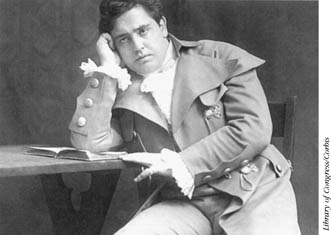
Tenor John McCormack gained recognition on the operatic stage before performing popular tunes worldwide.
The much-loved Irish tenor John McCormack had two careers. He was both a widely popular interpreter of Irish ballads and an operatic tenor who specialised in Mozart and the Italian repertory.
McCormack was born in Athlone, Republic of Ireland, on June 14, 1884. He was one of 11 children, only five of whom survived to become adults. At the age of 12, he won a scholarship to study at Summerhill College, Sligo, a Jesuit institution, but at 18 he decided to change his vocation from the priesthood to music, and went to Dublin to join the Palestina Choir. There, the young tenor won first prize at the Feis Ceoil, the national singing competition of Ireland.
In 1904, McCormack sang briefly at the Irish Village of the St. Louis Exposition in the U.S. (he resigned because he was offended when the actor hired to amuse the audience made jokes about Irish people). His appearance gained him a recording contract, however, and he used the money earned by the Irish music to go to Italy to further his study of bel canto, a 17th-century Italian vocal style. McCormack made his operatic debut in Savona in L’amico Fritz by Pietro Mascagni. On that occasion, he faked a high note and was not well received. He was not invited to sing at La Scala, but he sang at Covent Garden in 1907 as Turridu in Mascagni’s Cavalleria rusticana. One month later, he performed the role of Don Ottavio in Mozart’s Don Giovanni, a role with which he would be associated throughout his professional career. The florid phrasing and serene nobility of his interpretation were exactly right for the chivalrous and genteel Don Ottavio, and thus McCormack became a star of the operatic world. He was signed by Oscar Hammerstein I for his Manhattan Opera Company, and made his debut appearance in La Traviata in 1909.
However, McCormack was not a great actor, and he later confessed that he was never comfortable in operatic roles. In 1912, he decided to concentrate on the recital stage, and gave 67 concerts that year. While his performances still included many pieces from his classical repertoire, McCormack became increasingly well known for his interpretations of popular ballads and Irish folk songs. This shift in emphasis may have angered musical purists, but it earned the tenor huge popularity among the general public.

Tenor John McCormack gained recognition on the operatic stage before performing popular tunes worldwide.
McCormack gave over 400 concerts during World War I, many of which were benefits for the Red Cross. In 1919, McCormack became an American citizen and did not sing in England again until 1924, to protest against that country’s treatment of Ireland. He continued to make recordings through this period, and, despite his discomfort with acting, appeared in the film Song of My Heart in 1929.
McCormack’s singing career was ended by emphysema in 1942, and he died in 1945. His recordings of the part of Don Ottavio remain the standard by which all others are judged.
Jane Prendergast
Ledbetter, Gordon T. The Great Irish Tenor (London: Duckworth, 1977);
Worth, Paul, and Jim Cartwright. John McCormack: A Comprehensive Discography (New York: Greenwood Press, 1986).
The Art of John McCormack; John McCormack Sings Arias and Art Songs; McCormack in Irish Song; McCormack in Opera.